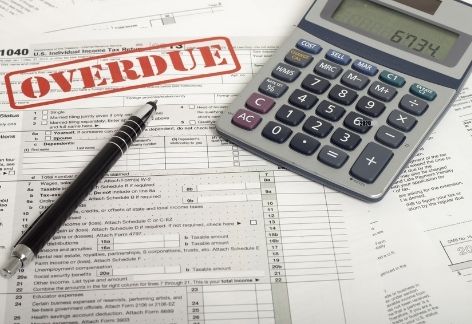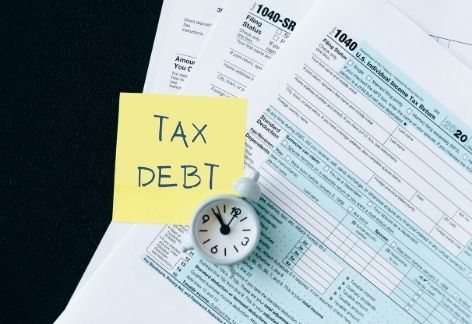How Does the IRS Notify You of a Tax Lien? A tax lien is one of the IRS’ strongest tools for coercing repayment of long-term or significant tax debt. While it might not constitute a physical claim of your belongings – meaning, the government is stopping short of taking your assets or garnishing your wages – it can still have a serious financial impact and can significantly prolong or complicate your ability to repay your tax debt in a timely manner.
Avoiding a tax lien is important if you owe the IRS money and haven’t been issued a notice yet.
And yes, worry not – the IRS will let you know if you’re the subject of a federal tax lien, in the form of a Notice of Federal Tax Lien. Among other things, this notice will declare that the United States has issued a lien on all property and rights to property belonging to the addressee, for the amount that they owe in taxes (plus interest and penalties).
It’s also worth mentioning that unlike your notice of an outstanding tax balance or your notice of impending wage garnishment, the notice of a federal tax lien is a public notice, first and foremost. This means a few different things.
How Does the IRS Notify You of a Tax Lien? Learn more below:
What is a Tax Lien?
“Lien” itself is a French loanword, referring to a band, tie, or restraint – which is what it’s meant to do. Financially speaking, a lien describes the creditor’s right to hold a debtor’s property until their debt is paid. In the case of a federal tax lien, it’s the IRS itself declaring that its debt supersedes any other claim on your property, and that your property is tied up into said debt. when the irs files a tax lien, it can severely limit your financial freedom and hinder your ability to obtain loans or credit. The lien essentially serves as a public record of your debt, making it difficult to do business or sell assets without settling the owed amount first. It is crucial to understand the implications of such a lien and seek prompt resolution to avoid long-term financial consequences.
This doesn’t mean that the IRS owns your home, but it does mean that they have a legal claim on your property now. This effectively secures the debt – if you try to sell or otherwise move your assets, the liquidated value of these assets must be used to repay the debt first.
Even if you sit on your assets and don’t do anything, a lien can have serious consequences.
What Does a Tax Lien Mean For You?
For one, it forces you to focus on the IRS’ debt first. If you aren’t very liquid to begin with, then suddenly all of your assets are tied up with your tax debt, and you can’t use them for financing, or to pay off something more urgent, like a mortgage payment. Secondly, it greatly limits your financial mobility. You cannot secure any financing with assets that are tied up in a debt.
Prior to 2017, a public notice of federal tax lien would also tank your credit score about as badly as a bankruptcy, and for about as long as one, too. This has been rescinded, so having a federal tax lien issued against you won’t kill your credit, but seen as the lien is public anyway, it will still affect your ability to seek financing for some time even after it’s been lifted, especially with creditors you might already be working with.
Finally, a tax lien is a serious commitment by the IRS. This means it doesn’t stop here. The IRS can and sometimes may assign a revenue officer to help with the collection process, which can include in-person visits to ensure that you begin paying your debt. If and when you decide to tackle your debt alone, you may be redirected to the IRS’ automated collection system, which means spending an inordinate amount of time listening to hold music over the phone.
More importantly, a lien is almost always followed by a levy if the debt remains unaddressed. Meaning if you decide to idle, the IRS will not – and they will start claiming and selling your property outright, or emptying your back accounts.
Tax Liens vs. Tax Levies
Do not confuse a federal tax lien with a tax levy. A levy is an action a creditor can pursue when a debtor fails to fulfil their obligation. A levy involves claiming an asset to be sold at its quick sale value and satisfy the debtor’s liability. Understanding lien implications in financial matters is crucial for both individuals and businesses. Failing to navigate these complexities can lead to significant repercussions, including the loss of property or assets. It is advisable to seek professional guidance to ensure compliance and safeguard financial interests.
When the IRS issues a tax levy, they usually start with one asset, sell it, and return the remainder if it was more than sufficient to cover the cost of the debt. If one asset wasn’t enough, the IRS may claim another. If a taxpayer does not have any assets aside from their primary residence or only vehicle, then it’s likely that the IRS will focus on their source of income, instead, issuing a levy on every incoming paycheck. This is called wage garnishment.
While the IRS can sell the family home, the IRS is obligated to stop short of rendering a taxpayer destitute. If the IRS’ methods are leaving you on the brink of indigency, then you may want to speak with a lawyer or taxpayer advocate about getting the IRS’ collection actions to cease temporarily.
Resolving Your Tax Lien
There are four options for resolving or amending a tax lien, and gaining some or complete financial freedom. These are:
- Convincing the IRS that they made a mistake or proving that you’ve already paid you debt by the time the lien was issued.
- Paying back the IRS in full, or at least engaging in good faith for a few consecutive months during the payment process.
- Requesting that a lien be subordinated, which means allowing a single creditor to supersede the United States’ interest in your property and rights to property.
- Requesting that a lien be discharged, which means removing it from a single item that you may use to secure a debt or pay off a more pressing and immediate problem.
For most taxpayers, the only reasonable option to combat a tax lien is to enter a payment plan. Yet not all payment plans are made equal. Understanding your payment plan options can save you a lot of time and money.
What If You Can’t Pay?
There are programs to help indigent taxpayers, whether by halting collection actions altogether, or by meeting them halfway, reducing their outstanding tax liability so the IRS can collect on some of what was owed, especially if it is unreasonable to assume that a taxpayer will be in the financial position to pay back everything.
How Does the IRS Notify You of a Tax Lien? A notice of federal tax lien can be frightening, but it is far from catastrophic. You have options. Get in touch with Rush Tax Resolution today to start formulating a gameplan to tackle your tax lien.











